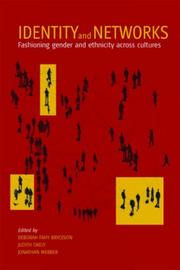| Listing 1 - 6 of 6 |
Sort by
|
Book
ISBN: 9781139016483 9780521849852 9781107531604 1139016482 9781139568869 1139568868 0521849853 1139888021 1139579274 1139573276 1139572423 1139570676 1283638568 1139569767 1107531608 Year: 2012 Publisher: New York : Cambridge University Press,
Abstract | Keywords | Export | Availability | Bookmark
 Loading...
Loading...Choose an application
- Reference Manager
- EndNote
- RefWorks (Direct export to RefWorks)
Family members, friends, coworkers and neighbors are often the first to know that a woman has been abused by an intimate male partner. What is the proper course of action for those with knowledge of abuse? Using a wide range of empirical data from international sources, Renate Klein documents informal third parties as the first port of call, sources of support and interference, and gatekeepers to formal services. Family and social network members disrupt ongoing assaults, respond to disclosures of abuse and provide solace and practical help. These networks do not always side with victims, however, and may either sympathize with or actively support perpetrators. Klein illuminates the complexities of these contingent situations. Her analysis highlights the potential of informal third parties for effective intervention, demonstrating their significant role in promoting societies free from rape and domestic violence.
Women --- Networks, New-girl --- Networks, Women's --- New-girl networks --- Women's networks --- Human females --- Wimmin --- Woman --- Womon --- Womyn --- Females --- Human beings --- Femininity --- Crimes against&delete& --- Prevention --- Social networks --- Crimes against --- Prevention. --- Social networks. --- Health Sciences --- Psychiatry & Psychology

ISBN: 9068327119 Year: 1999 Publisher: Amsterdam Royal tropical institute
Abstract | Keywords | Export | Availability | Bookmark
 Loading...
Loading...Choose an application
- Reference Manager
- EndNote
- RefWorks (Direct export to RefWorks)
Tijdens de Know How Conference on the World of Women's Information (Amsterdam, augustus 1998) stelde het Internationaal Informatiecentrum en Archief voor de Vrouwenbeweging (IIAV) aan de deelnemers het Mapping the World-project voor. Het gaat om een database, te raadplegen via internet, die informatie verschaft over meer dan 150 vrouweninformatiecentra over de hele wereld (http://www.iiav.nl/mapping-the-world). Na de conferentie werd de database op regelmatige basis geactualiseerd en aangevuld.Dit boek is de gedrukte versie van deze database, aangevuld met vier bijdragen over mondiale vrouwennetwerken en over vrouweninformatiediensten in Europa, Afrika, Azië en gebieden rond de Stille Oceaan. Het bevat tevens een bibliografie en een overzicht van relevante websites.
Women --- 396 <058> --- 842 Media --- 844 Sociale Structuur --- 848 Demografie --- 849 Gender --- Networks, New-girl --- Networks, Women's --- New-girl networks --- Women's networks --- Human females --- Wimmin --- Woman --- Womon --- Womyn --- Females --- Human beings --- Femininity --- Information services --- Social networks --- Documentation and information --- Community organization --- Mass communications --- Information management --- Networks --- Internet --- Bibliography --- Libraries --- Book --- Address book --- Documentation centre
Book
ISBN: 0822977885 9780822977889 9780822961888 0822961881 1306555469 9781306555463 Year: 2012 Publisher: Pittsburgh, Pennsylvania : University of Pittsburgh Press,
Abstract | Keywords | Export | Availability | Bookmark
 Loading...
Loading...Choose an application
- Reference Manager
- EndNote
- RefWorks (Direct export to RefWorks)
Rhetorical criticism. --- Rhetoric --- Sex role and globalization. --- Women --- Speech criticism --- Criticism --- Oratory --- Public speaking --- Language and languages --- Speaking --- Authorship --- Expression --- Literary style --- Globalization and sex role --- Globalization --- Networks, New-girl --- Networks, Women's --- New-girl networks --- Women's networks --- Social aspects. --- Social networks.

ISBN: 1845451619 9781845451615 9781845451622 1845451627 1782381988 9781782381983 Year: 2007 Publisher: New York, [New York] ; Oxford, [England] : Berghahn Books,
Abstract | Keywords | Export | Availability | Bookmark
 Loading...
Loading...Choose an application
- Reference Manager
- EndNote
- RefWorks (Direct export to RefWorks)
Contrary to the negative assessments of the social order that have become prevalent in the media since 9/11, this wide-ranging collection of essays, mostly by social anthropologists, focuses instead on the enormous social creativity being invested as collective identities are reconfigured. Using fieldwork findings drawn from Africa, Asia, and Europe, special emphasis is placed on the reformulation of ethnic and gender relationships and identities in the cultural, social, political, and religious realms of public life. Under what circumstances does trust arise, paving the way for friendship, collegiality, knowledge creation, national unity, or emergence of leadership? How is social life constructed as a collective endeavour? Does the means towards sociability become its end? And what can be said about the agency and collegiality of women? The inspiration for examining these conundrums is the work and persona of Shirley Ardener, to whom the volume is dedicated. Contributors: Jonathan Benthall, Deborah Fahy Bryceson, Gina Buijs, Sandra Burman, Hilary Callan, Gaynor Cohen, Janette Davies, Tamara Dragadze, Ronnie Frankenberg, Peter Geschiere, Kirsten Hastrup, Paula Heinonen, Maria Jaschok, Grazyna Kubica, Rhian Loudon, Sharon Macdonald, Zdzislaw Mach, Fiona Moore, Judith Okely, Lidia D. Sciama, Shui Jingjun, Cecillie Swaisland, Jacqueline Waldren, Jonathan Webber.
Philosophical anthropology --- Sociology of the family. Sociology of sexuality --- Ethnology. Cultural anthropology --- Sociology of culture --- Women --- Femmes --- Identity --- Social networks --- Identité --- Identité --- Southern Africa --- Great Britain --- China --- Poland --- Czaplicka, Maria --- Identity. --- Social networks. --- Networks, New-girl --- Networks, Women's --- New-girl networks --- Women's networks --- Female identity --- Feminine identity --- Identity (Psychology) --- Essays --- Race --- Feminism --- Gender --- Industry sector --- Judaism --- Relationships --- Women's movements --- Book --- Edited volume --- Colleagues --- Anthropology
Book
ISBN: 9781523098361 1523098368 9781523098378 1523098376 1523098392 9781523098392 9781523098354 152309835X Year: 2019 Publisher: Oakland, California : Berrett-Koehler Publishers, Inc.,
Abstract | Keywords | Export | Availability | Bookmark
 Loading...
Loading...Choose an application
- Reference Manager
- EndNote
- RefWorks (Direct export to RefWorks)
Joan Kuhl helps women create a clear vision of what their career path deserves to be and make a convincing business case for equality to their managers and senior leadership. You'll learn strategies for overcoming sexist cultural attitudes about gender and leadership, as well as for dealing with self-limiting behaviors like Imposter's Syndrome (the feeling that you're never good enough despite a track record of success) and the Myth of Meritocracy (the idea that just doing good work is the only way to advance). Because relationships are absolutely crucial, Kuhl describes how to build support networks before you even need them and explains how to get actionable feedback that will help you get to the next level—the kind women rarely are afforded. Case studies, practical exercises, and inspiring stories from Kuhl's work with clients at companies such as Eli Lilly and Company, Goldman Sachs, U.S. Soccer, BlackRock, South Carolina Asphalt Pavement Association and top business schools make this a truly comprehensive guide. It's an indispensable resource for women seeking to build the confidence and conviction to secure the seat at the table they've earned and create a welcoming workplace for everyone.
E-books --- Women --- Career development --- BUSINESS & ECONOMICS / Workplace Culture. --- BUSINESS & ECONOMICS / Careers / General. --- Networks, New-girl --- Networks, Women's --- New-girl networks --- Women's networks --- Career advancement --- Career ladder --- Career management --- Career planning --- Development, Career --- Development, Professional --- Employee development --- Organizational career development --- Professional development --- Personnel management --- Vocational guidance --- Employment of women --- Equal pay for equal work --- Sex discrimination in employment --- Working women in motion pictures --- Employment. --- Social networks. --- Occupations --- Employment --- Social networks
Book
ISBN: 9786613039262 9004184945 1283039265 9004187715 9789004187719 9781283039260 9789004184947 Year: 2010 Publisher: Leiden ; Boston : Brill,
Abstract | Keywords | Export | Availability | Bookmark
 Loading...
Loading...Choose an application
- Reference Manager
- EndNote
- RefWorks (Direct export to RefWorks)
Weaving Transnational Solidarity from the Catskills to Chiapas and Beyond analyzes the grassroots, economic justice work (1998-2009) of three groups-two Mexican organizations, Jolom Mayaetik, Mayan women's weaving cooperative, and K’inal Antzetik, NGO in the highlands of Chiapas, and an informal, international solidarity network. The book provides scholar-activist, ethnographic case study data which contributes to understanding collective organization, indigenous rights, and the solidarity process within transnational social movements and critically reflects on Fair Trade, health, and education solidarity efforts as well as the class, ethnic, and gender dimensions of neoliberal globalization. Central themes include solidarity, human rights, and social justice. Indigenous women’s voices are featured in the book as powerful in transnational justice organizing-in the global south and north. Critical Global Studies , volume 2
Distributive justice -- International cooperation. --- Indians of Mexico -- Mexico -- Chiapas. --- Textile cooperatives -- Mexico -- Chiapas. --- Women -- Social networks. --- Women in cooperative societies -- Mexico -- Chiapas. --- Women in cooperative societies --- Textile cooperatives --- Distributive justice --- Women --- Indians of Mexico --- Management --- Business & Economics --- Industrial Management --- International cooperation --- Social networks --- Industries --- International cooperation. --- Social networks. --- Networks, New-girl --- Networks, Women's --- New-girl networks --- Women's networks --- Indians of North America --- Indigenous peoples --- Meso-America --- Meso-American Indians --- Mesoamerica --- Mesoamerican Indians --- Pre-Columbian Indians --- Precolumbian Indians --- Ethnology --- Distribution (Economic theory) --- Justice --- Social justice --- Wealth --- Cooperative societies --- Moral and ethical aspects
| Listing 1 - 6 of 6 |
Sort by
|

 Search
Search Feedback
Feedback About UniCat
About UniCat  Help
Help News
News